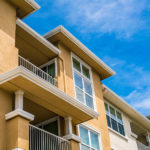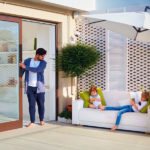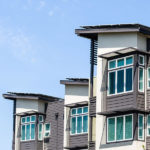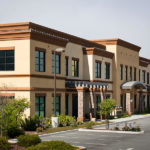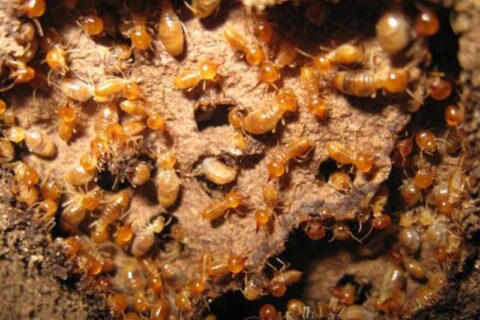Drywood Termites: The World’s Hungriest Houseguests
Of the termite species in California, Drywood termites are the second most destructive. While their colonies are smaller than those of subterranean termites, drywood termites do not need to live underground and can live entirely within the wood they are eating. This makes them difficult to detect, and by the time a homeowner realizes there is a Drywood termite problem, substantial damage may have already occurred. Here’s what you need to know about these hungry little houseguests and how to prevent them from taking up residence.
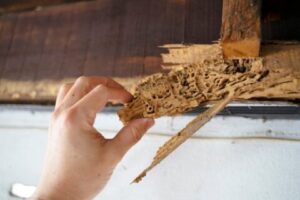
What are Drywood termites? They’re a termite species that doesn’t need as much water as other types of termites. Because of this, they can build their nests within wood members. Like other termites, Drywood termites have a complex social system, organized into castes. There are reproductive, worker, and soldier castes, and understanding this can help you spot a drywood termite infestation. Workers and soldiers stay within the nest, but young reproductive termites fly out in swarms, looking for mates and good locations for new colonies. Once they pair off, these swarmers drop their wings, which is one of the signs of an infestation. Other signs include termite droppings, resembling sawdust or sand, or wood that sounds hollow when tapped.
Drywood termite swarmers are often mistaken for carpenter ants because they often swarm at the same time. You can tell them apart, though, because termites have straight antennae and wings of equal size while flying ants have unequal wings and crooked antennae. Of course, both types of flying insects are destructive, so it’s best to call for professional help in either case.
Unlike other types of termites, Drywood termites do not eat soft, moist wood. Rather, they eat both with and across the grain of the wood, which is very damaging. A drywood termite infestation in your home’s frame can compromise its structural integrity. Generally, they infest wood that’s above ground, and even in higher levels of structures where temperatures may be warmer. They can enter a home through exposed wood or can be carried indoors on infested wooden furniture. Even picture frames can harbor Drywood termites. While Subterranean termites need to use mud tunnels to enter your home to stay moist, Drywood termites can pull the moisture they need from the wood they digest. This makes them harder to spot than other termites.
Once inside a structure, Drywood termites chew through wooden support beams, floors, and walls, with no differentiation between hard or softwood. Even though subterranean termites have larger colonies, the galleries of Drywood termites built within the wood are wider and cause more damage. A Drywood termite gallery can compromise the wood to the point that it is entirely destroyed and collapses. Further, because Drywood termites leave few signs and live entirely within a wood source, their colonies can grow for years before they’re noticed.
The best way to keep Drywood termites from destroying your home, then, is by taking preventive measures. Drywood termite prevention is achievable if you follow a few simple tips.
- Store firewood and scrap wood at least 20 feet away from the house, off the ground.
- Keep termites from gaining access to your home by sealing all cracks and crevices.
- Where wood is weathered or paint is peeling, seal or paint the wood to keep it protected.
- Regularly inspect your home for signs of drywood termites. Once a year, have an inspection done by a termite control professional.
- Make sure your window and door frames, trim, eaves, siding, and attic are painted or sealed.
- Use treated wood in any new construction or renovation.
- Clear any dead trees and stumps from your property.
A professional termite control company can help prevent a drywood termite infestation, as well as rid your home of any existing termites. There are several different methods they’ll employ to accomplish these goals.
- Spot treatment is used to address the colony directly. Once the exact location of termite activity is located, holes are drilled into the wood. The area is then filled with termiticide, to eliminate the termites.
- Orange oil can be sprayed directly into the colony. Extracted from orange peels, orange oil contains a substance called d-limonene, which kills termites by dissolving their exoskeletons.
- A termiticide barrier can be applied along the foundation or perimeter of a home. Termites who eat cellulose treated with termiticide will die, and so will termites that simply come into contact with the product, without ingesting it. Before they succumb to the effects of the termiticide, they carry it back into their colony, transferring the termiticide to other termites.
Whether you suspect a Drywood termite infestation or need an inspection, call the termite control professionals at MightyMite Termite Services. At MightyMite, we’ve earned a reputation as experts in California termite control. We perform termite inspections to ensure that your home is free of termites and work hard to help you keep it that way, using treatments that are naturally derived and have a low impact on the environment. We diagnose and treat infestations with the most effective methods and unmatched warranties, solving your termite problems the first time, with an industry best “no call-back rate.” That, combined with our experience, technology, and highly trained professional staff, makes us the leading extermination company in the Bay Area. We understand that your home is your most important investment, so we work hard to provide excellent service, utilizing best practices to solve our customers’ termite problems. For more information, email Info@mightymitetermite.com, call us today at 408.335.7053, or contact us through our website.

